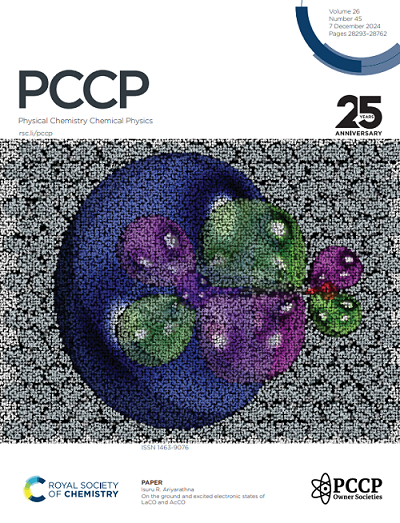通过桥接单元的配位二分法操纵受挫Lewis对对CO2的反应性
IF 2.9
3区 化学
Q3 CHEMISTRY, PHYSICAL
引用次数: 0
摘要
邻碳硼烷是分子内受挫路易斯配对(IFLPs)最通用的桥接单元之一,这是因为笼状结构具有配位二分性。只需将活性中心置于碳硼烷单元上的不同配位点,就可以调节活性中心的酸碱性,从而控制与 CO₂ 反应的热力学、动力学和机理途径。本文章由计算机程序翻译,如有差异,请以英文原文为准。

Puppeteering the reactivity of frustrated Lewis pairs toward CO2via coordination dichotomy in bridging units†
o-Carborane can be regarded as one of the most versatile bridging units for intramolecular frustrated Lewis pairs (IFLPs) due to the coordination dichotomy of the cage. The acidity and basicity of the active centres can be modulated to control the thermodynamic, kinetic, and mechanistic pathways of the reaction with CO2 simply by positioning the active centres at different coordination sites on the carborane unit.
求助全文
通过发布文献求助,成功后即可免费获取论文全文。
去求助
来源期刊

Physical Chemistry Chemical Physics
化学-物理:原子、分子和化学物理
CiteScore
5.50
自引率
9.10%
发文量
2675
审稿时长
2.0 months
期刊介绍:
Physical Chemistry Chemical Physics (PCCP) is an international journal co-owned by 19 physical chemistry and physics societies from around the world. This journal publishes original, cutting-edge research in physical chemistry, chemical physics and biophysical chemistry. To be suitable for publication in PCCP, articles must include significant innovation and/or insight into physical chemistry; this is the most important criterion that reviewers and Editors will judge against when evaluating submissions.
The journal has a broad scope and welcomes contributions spanning experiment, theory, computation and data science. Topical coverage includes spectroscopy, dynamics, kinetics, statistical mechanics, thermodynamics, electrochemistry, catalysis, surface science, quantum mechanics, quantum computing and machine learning. Interdisciplinary research areas such as polymers and soft matter, materials, nanoscience, energy, surfaces/interfaces, and biophysical chemistry are welcomed if they demonstrate significant innovation and/or insight into physical chemistry. Joined experimental/theoretical studies are particularly appreciated when complementary and based on up-to-date approaches.
 求助内容:
求助内容: 应助结果提醒方式:
应助结果提醒方式:


